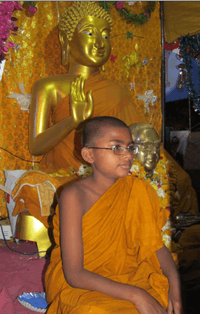Bhante
Bhante (Pali; Nepali; Burmese: ဘန္တေ, pronounced: [bàɴtè], Sanskrit: vande and vandanā[1]) is the polite particle used to refer to Buddhist monks in the Theravada tradition. Bhante literally means "Venerable Sir."[2]

Young Indian Buddhist monk in Indian monastery
The Pali word "bhante" is a gender neutral term, unlike "bhikkhu" or "bhikkhuni". It is equivalent to Sanskrit verb 'Vande' or 'Bande' as in the song Vande Mataram. Vande means a reverential action of 'bowing' to someone or something. The Nepali terms for the Buddhist priestly caste, bare and bande, have the same derivation.[3]
Some famous bhantes are:
- Bhante Cintita
- Bhante K. Sri Dhammananda
- Bhante Shravasti Dhammika
- Bhante Dharmawara
- Bhante Henepola Gunaratana ("Bhante G.")
- Bhante Dhammalok Mahasthavir
- Bhante Kumar Kashyap Mahasthavir
- Bhante Pragyananda Mahasthavir
- Bhante Sitagu Sayadaw
- Bhante Vimalaramsi
Grammatically "bhante" is a vocative case form of a Pali word "bhadanta" (venerable, reverend).[4] The vocative case denotes and is used for address.[5]
See also
References
- ↑ The Circle of Bliss: Buddhist Meditational Art by John C. Huntington, Dina Bangdel. Serindia Publications: 2003 ISBN 1932476016 Page 29
- ↑ Rhys Davids, Thomas William; Steele, William, eds. (1905). The Pali-English dictionary (Reprint of Oxford 1905 edition, circa 1997 ed.). New Delhi / Chennai: Asian Educational Services. p. 498. ISBN 81-206-1273-6. External link in
|publisher=(help) - ↑ The Circle of Bliss: Buddhist Meditational Art by John C. Huntington, Dina Bangdel. Serindia Publications: 2003 ISBN 1932476016 Page 29
- ↑ Value Bhadanta, bhaddanta Pali Text Society Pali-English Dictionary
- ↑ Buddhist Precept & Practice Gombrich, Richard F. Claredon Press: 1995 ISBN 0710304447, Page 141
This article is issued from Wikipedia - version of the 8/16/2016. The text is available under the Creative Commons Attribution/Share Alike but additional terms may apply for the media files.